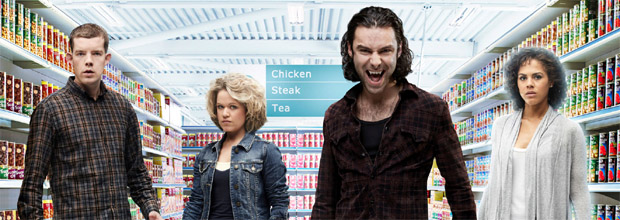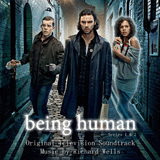
Featuring original music by composer Richard Wells from Series 1 and 2, a soundtrack album for BBC Three’s supernatural comedy-drama Being Human is released this week.
Being Human‘s music was nominated for the BAFTA Original Television Music award in 2010. CultBox caught up with Richard to find out more…
How did you first get involved with Being Human?
“I was asked in for an interview with Rob Pursey (executive producer) after the pilot had been made. I wasn’t aware of the pilot, but I looked it up on YouTube and watched it in six tiny bits the night before and really enjoyed it. It was right up my street.
“I went in with some ideas for an approach to the music. I wasn’t expecting to get it as I hadn’t done any TV before. But Rob and I got on immediately and he talked with producer Matt Bouch and music supervisor Ross Sellwood and they decided to take a risk and get me involved.”
What is your personal favourite piece you’ve composed for Being Human so far?
“‘A Wonderful Thing’ resonates with a lot of people, but I would go for ‘Resurrection’ in Series 1, because it is very simple but emotive; ‘Annie’s Door’ in Series 2 – it’s the most frightening thing I’ve ever written – and from Series 3 probably ‘George And Mitchell’.
“This was really tough to write. I had to create the score for an emotional showdown between the two lead guys, who’ve never really talked about emotions with each other before. It’s in Episode 8 so I can’t really say any more about it. But I’m hoping tears will be shed!”
Has there been any particular episodes or scenes from Being Human for which you’ve had difficulty deciding what sort of music would work best?
“I haven’t had too many difficulties deciding on style, but where it is difficult sometimes is deciding how far to push an idea. I have to be particularly careful with dialogue scenes, or the music just gets turned down. Being led by the pictures gives me a map and a few clues as to where to go with the music.”
Does Toby Whithouse ever give you any notes on what sort of music he has in mind for a scene?
“We hardly ever talk because Toby is always at a different point in the production from me and I think he more or less trusts me by now. When he finishes one series I’m just beginning and then he’s starting to write the next one. I tend to be left to my own devices, so the first time anyone hears the music is usually in the dub (final mix). I’m very lucky with that.”
How long do you envisage working on Being Human for?
“As long as they want me!”

Was it hard choosing which tracks to include on the new Being Human album?
“All the important themes had to be on the album. But apart from those there was nearly five hours of original music so it took a long time to work out what to include and what to leave out, while keeping it true to Being Human. Ultimately it’s for the fans, so it was well worth spending the time, trying to get it right.”
Will there be a Series 3 soundtrack album at some point?
“I’m determined there will be. I’ve already got a running order and funnily enough it works better in many ways than Series 1 and 2, as there is a thematic thread running throughout it.
“The basic problem with soundtracks is that no-one makes much money out of them, so there is rarely any enthusiasm from the rights owners. It is really down to the composer to persuade them it’s worth doing and I’m on the case!”
How did you first get into writing TV/film scores?
“I was working on a computer game called MIA in 1997 with director Jake West. A few weeks later he asked me to write the music for his first feature, Razor Blade Smile. At this point I hadn’t even done a short film, so I went out and bought a book called ‘On The Track’ (basically a crash course in film scoring) and read it cover to cover. The whole film was super low budget, but a great way to learn the ropes without too much pressure, although it didn’t feel like that at the time!
“I’ve done two more features for Jake since then (Evil Aliens and Doghouse) and he is always brilliant to work with. Since a young age I’ve had a love of film scores. Music and pictures working together is a wonderful thing.”
Were you a fan of the work of composer John Barry, who sadly passed away recently, and were there any particular scores of his that you enjoyed?
“I’m a huge fan. With Zulu and James Bond he probably left a bigger impression on me in my youth than any other single composer. The Lion In Winter, Out Of Africa and Dances With Wolves are all fabulous scores. He will be sadly missed.”
Which other film/TV composers do you admire and have influenced you?
“It’s a long list but – apart from John Barry – near the top would be Ennio Morricone, Gerry Goldsmith, Marco Beltrami, Dario Marianelli and Hans Zimmer. But I’d include less well known film writers like Brian Eno, Antonio Pinto, Jon Hopkins (Monsters) and Christian Henson. I listen to a lot of film music and I never grow bored of original stuff.”
Are there any current TV shows that you enjoy the scores of?
“I don’t have the opportunity to watch much TV, but Daniel Licht’s music for Dexter is excellent.”
In 2005 you re-scored the Thai martial arts film Ong-Bak. How did this come about and was it odd re-scoring an existing film?
“Brian White, who was working at Contender Entertainment, approached me. I was doing a lot of martial arts trailers at the time for them and they were worried that the original score for Ong-Bak was not sounding right for a western audience. Because the project was put on hold at one point, I ended up with only five weeks to score and record it, so I didn’t have much time to think about what an odd job it was!
“Anyway I loved the film. From an action point of view it is one of the great martial arts movies of all time, so it really wasn’t difficult to get excited about it. The rest of my life was put on hold. Amazingly I was on holiday immediately after and discovered that my wife was expecting our first child and after five years of trying unsuccessfully! That was a huge bonus.”
You’ve also scored several games in the past. How does writing music for games differ to writing music for film and TV?
“I met a charming guy called Dave Punshon in the mid ‘90s who was doing games music and I did some recording for him and ended up writing about 25 game scores, many with him. You could write a whole essay on how games music differs from film and TV, but a simple answer is probably that the game music is normally interactive and of course there is the issue of the player’s perspective and involvement, which you don’t get in film.
“With in-game music there is also the technical issue of making it interesting and appropriate for long periods of time while knowing that it is not locked to the pictures. But in the end it’s all music and although the approach might be a bit different the music often ends up sounding surprisingly similar. You just get there in a different way.
“Games companies are generally pretty conservative and their idea of a good score is often the latest Hollywood hit movie soundtrack. Look out for Inception clones! I take my hat off to those who take a risk and try something innovative.”
Are you a regular gamer yourself?
“I’m definitely a closet gamer. I don’t get much chance at the moment with work and two small kids. It’s a guilty pleasure if I ever get on a gaming console!”
What advice would you give to anyone wanting to get into your line of work?
“Be proactive. I was never good at getting out there and meeting people, but I would say that making contacts is more than half the battle. You have to go after work. Don’t expect that by sending out a few demos the phone is going to start ringing. Bang on doors and don’t be put off by a “No”. All easier said than done by us sensitive artistic types. But the great thing about being a composer is that you can be proactive.
“There’s no excuse for not writing a piece of music every day and it’s never been easier to get it heard by people. Inevitably there’s a lot of competition and it’s probably never been more difficult to get paid when starting out, but you have to persevere and then the opportunities will come.”
With Series 3 of Being Human completed, what else have you got coming up?
“Hopefully Series 4 and currently an album for The Scoring House. There’s also a possible movie and I want to get an ambient album I did last year with Rob Foster released commercially, so I’m going to have to go and bang on some doors myself!”

